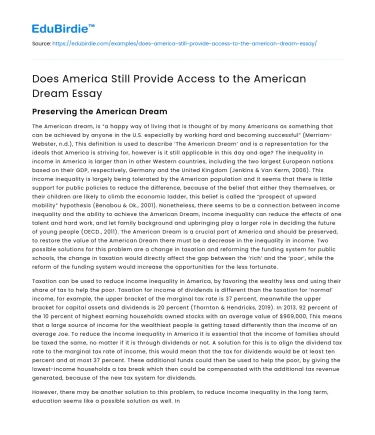Preserving the American Dream
The American dream, is “a happy way of living that is thought of by many Americans as something that can be achieved by anyone in the U.S. especially by working hard and becoming successful” (Merriam-Webster, n.d.), This definition is used to describe ‘The American Dream’ and is a representation for the ideals that America is striving for, however is it still applicable in this day and age? The inequality in income in America is larger than in other Western countries, including the two largest European nations based on their GDP, respectively, Germany and the United Kingdom (Jenkins & Van Kerm, 2006). This income inequality is largely being tolerated by the American population and it seems that there is little support for public policies to reduce the difference, because of the belief that either they themselves, or their children are likely to climb the economic ladder, this belief is called the “prospect of upward mobility” hypothesis (Benabou & Ok., 2001). Nonetheless, there seems to be a connection between income inequality and the ability to achieve the American Dream, income inequality can reduce the effects of one talent and hard work, and let family background and upbringing play a larger role in deciding the future of young people (OECD., 2011). The American Dream is a crucial part of America and should be preserved, to restore the value of the American Dream there must be a decrease in the inequality in income. Two possible solutions for this problem are a change in taxation and reforming the funding system for public schools, the change in taxation would directly affect the gap between the ‘rich’ and the ‘poor’, while the reform of the funding system would increase the opportunities for the less fortunate.
Taxation can be used to reduce income inequality in America, by favoring the wealthy less and using their share of tax to help the poor. Taxation for income of dividends is different than the taxation for ‘normal’ income, for example, the upper bracket of the marginal tax rate is 37 percent, meanwhile the upper bracket for capital assets and dividends is 20 percent (Thornton & Hendricks, 2019). In 2013, 92 percent of the 10 percent of highest earning households owned stocks with an average value of $969,000, This means that a large source of income for the wealthiest people is getting taxed differently than the income of an average Joe. To reduce the income inequality in America it is essential that the income of families should be taxed the same, no matter if it is through dividends or not. A solution for this is to align the dividend tax rate to the marginal tax rate of income, this would mean that the tax for dividends would be at least ten percent and at most 37 percent. These additional funds could then be used to help the poor, by giving the lowest-income households a tax break which then could be compensated with the additional tax revenue generated, because of the new tax system for dividends.
Save your time!
We can take care of your essay
- Proper editing and formatting
- Free revision, title page, and bibliography
- Flexible prices and money-back guarantee
However, there may be another solution to this problem, to reduce income inequality in the long term, education seems like a possible solution as well. In America, public schools receive funding from three different sources: federal, state, and local sources (Biddle & Berliner, 2002). Fifty percent of the funding; however, is provided through the local property taxes, This means that schools in low-income areas receive less funding than schools in high-earning areas, because the high-income areas often have more expensive houses, so they need to pay more property taxes, for the low-income areas applies the opposite (National Center for Education Statistics, 1998). With access to more funding, the schools in high-income regions often provide better education since they can afford to pay higher wages to teachers, and they can buy ‘better’ learning material for example: recent books, tutoring programs, etc... Students are not granted the same level of education and this is crucial in keeping the American dream alive. If students get different qualities of education, the gap between the rich and the poor will remain, since the poor will get a worse education so they are not able to go to renowned universities and colleges, This means that they also have a decreased chance of gaining a quality degree and with that obviously comes a decrease in the chance of obtaining a job that pays well. To level the educational playing field and with that the income inequality in the long run, the funding system for public schools should be adjusted, instead of funding through the local property taxes, there should be a national amount per student-funded and an additional bonus for every public school. This will grant the schools relatively the same budget, because for every single enlisted student, a school gets X amount of money, for example, if X would be $2000, then for every student a school has, for our example, we will use 200 students, a school would get 200 x 2000= $400,000 as its budget. Furthermore, the additional bonus will benefit the schools that prioritize the success of their students, it will motivate the public schools and their teachers to achieve the highest number of graduates possible and to use their recourses as efficiently as possible (Martin, Boser, Benner, & Baffour, 2018).






 Stuck on your essay?
Stuck on your essay?

